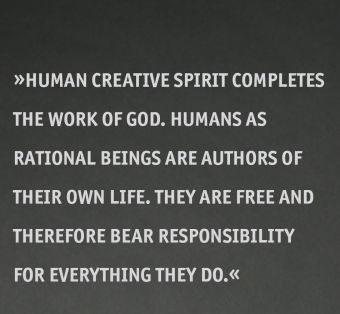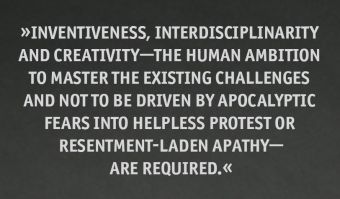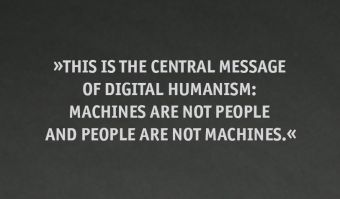
Digital transformation as a second renaissance?
Prof. Dr. Dr. h. c. Julian Nida-Rümelin, Staatsminister a.D., Director of Bavarian Institute for Digital Transformation and Vice-Chair of German Ethics Council, Munich

Digital transformation as a second renaissance?
Towards digital humanism
The European Renaissance began first in Italy after a period of exhaustion by plagues, misery and wars. In the mid-14th century, the plague had plunged Europe into one of the worst catastrophes of mankind, an incurable disease that brought great pain to those afflicted and usually a quick death. Even before the plague, a long-lasting famine had taken hold, for which climate change in the form of significantly falling temperatures probably played a decisive role. The structures of social order eroded and everyday life became brutalised. The population declined markedly, with the paradoxical effect of a valorisation of human labour and an increase in productivity brought about by new technologies. The European Renaissance was preceded by a creeping decline in the authority of clerical and princely authorities, and was characterised by a return to ancient thought, especially that of the Greek Classical period and the Roman Empire. Aristotle was disposed of—prematurely—because the Thomasian worldview, unlike patristics, was based on his writings and had made them the authoritative source alongside the Holy Scriptures.
The young intellectual Pico della Mirandola (1463-1494), born into high wealth and highly gifted, published his writing De hominis dignitate (Rede über die Würde des Menschen EA: 1496) and ensured that it was discussed throughout Europe by intellectuals and eventually also by ecclesiastical authorities. At the centre was an image of God that endows man with artistic creativity, technical innovation, and scientific research; indeed, one might say that in this writing Pico della Mirandola anticipated the thesis of the analytical philosopher Roderick Chisholm that man, like God, is an unmoved mover (Die menschliche Freiheit und das Selbst (1964), S. 82). Human creative spirit completes the work of God. Humans as rational beings are authors of their own life. They are free and therefore bear responsibility for everything they do. Only Immanuel Kant thought the consequences to the end in his practical philosophy of autonomy.
The Renaissance was an epoch of impressive innovation. And like other innovative periods in human history, it was characterized by the breaking up of schools and conventions, by interdisciplinarity, and by the fluid transition of philosophy, science, technology, and art. Education was no longer the learning of preconceived patterns of thought and practice, but self-education with the goal of life-authorship. Leonardo da Vinci did not know whether to see himself as a scientist, technician or artist. The Renaissance cities became documents of impressive design in the combination of technology, craftsmanship, art and science.Are we on the threshold of an era of comparably far-reaching innovations, shaped by the potential of digital technology? To be able to assess this, we first have to face a sobering fact. The third wave of digitisation has not yet made a significant contribution to either labour-hour or resource
productivity. The platformisation of the economy has reshaped it to some extent and created large tech giants, but it has not stimulated growth, or at least not noticeably. In a ranking by the World Economy Forum a few years ago, Germany landed in first place among the most innovative countries in the world—probably to the surprise of the authors—while at the same time being one of the most digitally backward. Working hour productivity in Germany is almost a third higher than the EU average while almost all European countries are outstripping Germany in terms of digital transformation. The productivity of the German economy is just behind Norway and Switzerland, but well ahead of France, Canada, the U.S. and Japan (which leads the East Asian countries). The productivity boost that digitisation triggered with the introduction of personal computers and the use of the Internet in the 1990s has not been repeated in the third wave. At the same time, however, the world is in dire need of a technologically-driven increase in productivity in the face of resource scarcity, ecological depletion and climate change.

All the inadequate efforts to cut CO2 since the 1990s have been far outweighed in Europe by the additional CO2 emissions of the Chinese economy. Meanwhile, the Chinese economy is polluting the atmosphere with climate gases at a higher rate than the US and Europe combined—even though China’s economic output ranks only third after the US and after the EU. If other current and future boom regions such as India or sub-Saharan Africa follow the development path of China, the climate catastrophe in large parts of the world cannot be stopped. The digital transformation must enable other development paths and use human and natural resources far more sparingly without stifling economic momentum in a development phase where the demographic dividend pays off in the global South.
Inventiveness, interdisciplinarity and creativity—the human ambition to master the existing challenges and not to be driven by apocalyptic fears into helpless protest or resentment-laden apathy—are required. A rapid changeover to climate-neutral and ecologically sustainable economic activity, first and foremost in the highly industrialised countries, the treading of new technological, economic and social development paths in fair cooperation between the world’s regions and the mobilisation of human resources in order to overcome the major challenges facing humanity will only be possible with the massive use of digital technologies.
Not data thriftiness, but protection of personal rights and use of data for humane progress in medicine, natural science and education, in state administrations, small and medium-sized enterprises, the efficient and effective organisation of social cohesion, are indispensable for this. The humanistic ideal of human authorship, self-education and creative power must experience a renaissance under digital auspices.
Responsibility remains solely with human actors. Software systems, highly developed so-called „autonomous“ ones as well as those which are called „artificial intelligence“ (AI), are not actors, not people. Man does not become God, who creates other individuals in his image to use them at will for himself. They are merely technical, albeit highly sophisticated, tools that we should use individually and collectively, legally framed and politically shaped, for the good of humanity. This is the central message of Digital Humanism: machines are not people and people are not machines. The currently fashionable AI animism is unscientific mumbo jumbo, a projection of a familiar type that animates the unsouled and gives satisfaction to the swashbucklers. And man is not a machine, not an algorithm-controlled software system, but a freely responsible actor of his actions. Digital technologies will not relieve him of this responsibility, but neither will they take away his freedom to individually and collectively shape life and its conditions.

The renaissance of digital transformation is based on the empowerment of human authorship, on the development of human creativity, on the targeted, intelligent and measured use of new technologies for human purposes. It aims to humanise the world of work through sustainable production and the establishment of fair practices in the global economy, while the current development path has established monopoly structures in the form of large tech giants, shifted greater parts of economic value creation to platforms and made a successful business model out of the skimming of user data from digital service offerings for marketing purposes. This humanistic form of digital transformation will not be feasible without a state framework in the form of digital infrastructures, without an independent European path of „human centred AI“ and transparent uses while safeguarding informational self-determination rights, without a European legal framework of digital dynamics. But the chances are good that the humanistic form will ultimately prevail over the commercial model of Silicon Valley and the state control model of China and other autocratic and totalitarian states.
Prof. Dr. Dr. h. c. Julian Nida-Rümelin, Staatsminister a. D.
Julian Nida-Rümelin teaches philosophy and political theory at Ludwig Maximilian University in Munich.JNR was a member of the first Schröder cabinet as Minister of State for Culture and Media. He is a member of the Academy of Sciences in Berlin and the European Academy of Sciences, director at the Bavarian Institute for Digital Transformation (bidt). In 2016, the Bavarian state government awarded him the medal for special services to Bavaria in a United Europe. In 2019, he received the Bavarian Order of Merit. Since May 2020, he has been a member (as deputy chairman) of the German Ethics Council. In 2016, Humanistische Reflexionen (Humanistic Reflexions) was published by Suhrkamp. In the fall of 2018, he published a monograph on Digitaler Humanismus: Eine Ethik für das Zeitalter der künstlichen Intelligenz (Digital Humanism: An Ethics for the Age of Artificial Intelligence) (Piper Verlag), for which he received the Bruno Kreisky Prize in Austria for the best political book of the year. In spring 2020, edition Körber published Die gefährdete Rationalität der Demokratie (The Endangered Rationality of Democracy) and DeGruyter Eine Theorie praktischer Vernunft (A Theory of Practical Reason). Picture © Diane von Schoen

